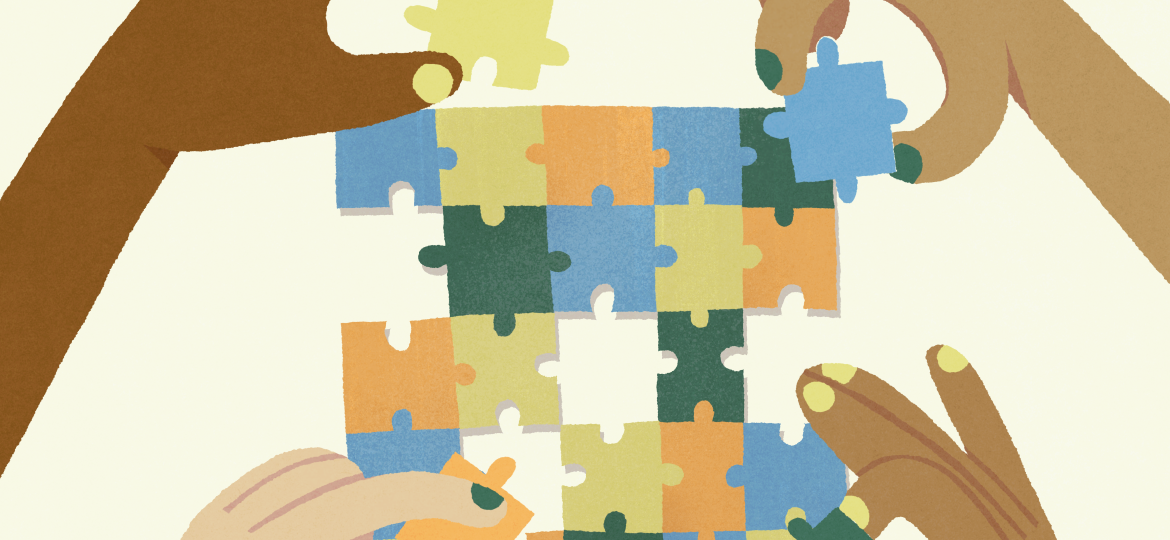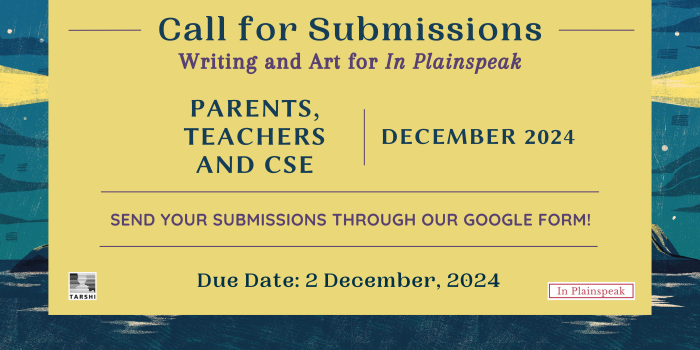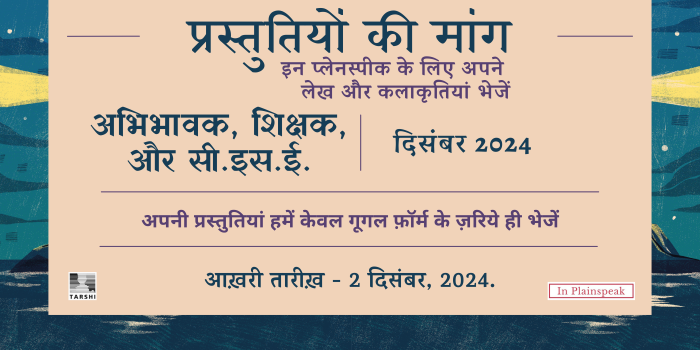
Gender and sexuality are like constituent parts of a jigsaw puzzle that keeps morphing in such a way that nothing ever ‘fits’ for long, and the game begins anew each time. For some, that’s the never-ending joy and fun of it. For others, the game must have strict rules, the pieces cut to fit just so, everything neat and tidy, confined to its place. Does, and should, real life work like that? Quite simply, no. A predictable world in which everyone is ‘kept in their place’ and obeys the rules around gender and sexuality serves the interests of only one master, patriarchy, and his favoured few. Which is exactly what all our contributors to the October 2024 issue of In Plainspeak conclude.
Sindhu Rajasekaran cogently breaks down the ideas of sex, gender and femininity to clearly explain how gender fluidity laughs at patriarchy and its sexist rules, upending the very idea of power and inviting us to create the future. Susmit Panzade looks at queer bodies, queer spaces and queer belonging to illustrate how shifts in gender codes vary according to caste and other social markers.
Several poems this time, dear readers. In Matryoshka, Sara Haque writes searingly of the gods that make and unmake us. Unmana brings us three poems that though seemingly disparate are linked by those invisible threads we call ‘expectations’. In Loving Yourself, Aashi Singh denounces social regulations around gender, urging us to do the same. Anamika Jha’s three poems in Hindi speak of the freedom to be.
Plus, we are introducing a new feature – On the Ground With… in which we catch up with different organisations to highlight interesting experiences, intersections and insights from their work. For our first feature, we have Maraa, an arts and media collective based in Bangalore, bring us real stories from the ground to tell us why and how they do what they do.
We bring you three Hindi translations this time. Anupom Kumar Hazarika writes about himself, his father, other fathers and multiple masculinities. Neel writes about her bruises and resilience in the face of her mother’s rejection. Sharada Vinod writes about the labour that two women in her life, at different ends of the socio-economic spectrum, performed, and the sense of sisterhood they shared.
Gender and sexuality – the pieces keep morphing and that’s the thrill and joy of it. Stay open to change, keep playing!
November 2024’s issue of In Plainspeak shows how the constituent parts of our ever-morphing gender and sexuality jigsaw puzzle are busy leaping, jigging and dancing about. Across social media, the Internet, educational institutions, digital data, films, gyms, homes, a badminton court, art, and more. Let’s jump right in!
Shikha Aleya, in an interview with a difference, dips her feet into the cross currents of what people are saying, and consuming, on the Internet, particularly on social media, on the subject of gender and sexuality. As expected, a lot. The language they use reveals how humans and machines think about gender and sexuality, and sometimes it seems that machines are programmed to be more respectful and accepting than many humans!
Chand, in an original Hindi interview (our first!) with Akshita Singh and Pragya Solanki, talks about what makes for safe spaces beyond just the intent to create or to be part of one. Why safe spaces are important for LGBTQIA+ people, how educational institutions can create and maintain safe spaces, how they can be started in small towns and cities and not only the metros, are just some of the issues they address with compelling political insights and arguments. Read the English translation here.
Vanshika Gupta and Niv tell us how queer people in India are using digital platforms as vital spaces for negotiation, community-building and resistance, to reclaim citizenship by expanding its definition beyond state-sanctioned identities to include everyday practices of belonging and recognition.
On a more sombre note, Brindaalakshmi K shares the results of a study looking at the digitisation of the process of changing one’s identification document after the enactment of the Transgender Persons (Protection of Rights) Act 2019. Brindaa describes the data and rights exclusions that transgender people are experiencing because of this. Speaking of discrimination, Anuja Tripathy writes about how a film opened her eyes to what women go through in the home and outside, how pervasive discrimination is, and the different forms and shapes it takes.
In Khawahish Asha Kishor’s poem Fragile Facts and Fearless Feelings we unexpectedly meet some familiar figures from academic and political circles of gender and sexuality (Hint – look out for the Pride-colour-coded text).
An exhibition of artworks can be a glorious space to play with ideas about gender and sexuality and that’s exactly what the TARSHI team found the gFest Gurugram edition to be, and were inspired to write about the insights they gleaned.
Now for some fiction and more art to stimulate other synaptic connections. Read Sakshi Nain Bishnoi’s gripping short story about how a badminton court “is a universe in microcosm” and Niv, Vanshika Gupta and Anjani Chadha’s poignant account of the solitude their protagonist experiences within academia, despite the outward bonhomie of their friends. In Brushstrokes, Suryaa Rajan presents a series of beautiful illustrations she created “to learn to love every bit of myself again”.
We have three Hindi translations for you, this time. Sreejani’s article on wondering how it would be if we grew up embracing sexuality; Shiva Chauhan’s article about verbal and non-verbal communication that expresses different elements of gender identity in gym spaces; and Aditi Mishra’s article on media portrayals of gender and sexuality and her own journey of moving to unlearning inequality.
Finally, check out Quick Bytes to see what our respondent Taash has to say on Gender and Sexuality.
Through this whole issue, the gender and sexuality puzzle pieces are leaping, jigging and dancing about, sometimes joyfully, sometimes rebelliously. Long live the ever-morphing puzzle!

